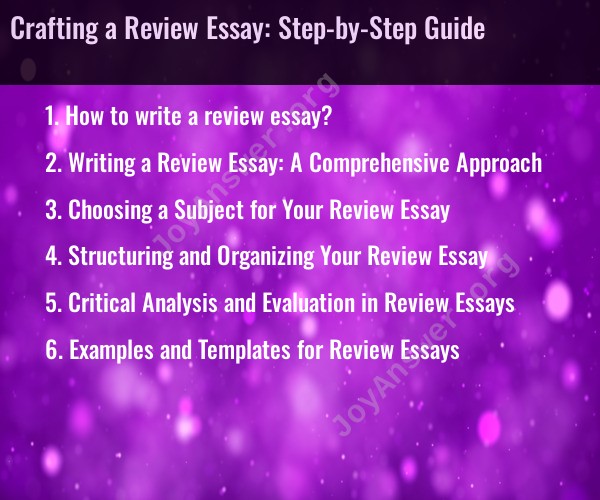How to write a review essay?
Writing a review essay involves critically analyzing and evaluating a particular work, such as a book, film, article, or product, and expressing your informed opinions on it. Here's a step-by-step guide on how to craft a review essay:
Choose a Topic:
- Select the specific work or subject that you want to review. It could be a recent movie, a book, a restaurant, a piece of literature, or any other item of interest.
Understand the Purpose:
- Determine the purpose of your review. Are you providing an objective assessment, expressing your personal opinion, or both? Consider your target audience and what they expect from your review.
Engage with the Work:
- Read, watch, or experience the work carefully. Take notes on important details, themes, characters, plot, or any other aspects that you want to address in your review.
Provide Context:
- Begin your review with a brief introduction that provides context about the work you're reviewing. Mention the title, author, director, publication date, and any relevant background information.
Summarize the Work:
- Summarize the content or plot of the work. Keep this section concise and objective. Avoid spoilers if you're reviewing a book, movie, or series.
Analyze and Evaluate:
- The heart of your review is the analysis and evaluation. Consider the following aspects depending on the nature of the work:
- Writing style (for books and articles)
- Cinematography and direction (for films)
- Acting (for movies and plays)
- Plot development
- Characters and their development
- Themes and messages
- Originality and creativity
- Strengths and weaknesses
- Your overall impression and emotional response
- The heart of your review is the analysis and evaluation. Consider the following aspects depending on the nature of the work:
Support Your Opinions:
- Back your analysis with specific examples and evidence from the work. Quote passages, cite scenes, or reference specific moments to illustrate your points.
Discuss the Audience:
- Consider the target audience and whether the work effectively caters to their expectations or interests.
Compare and Contrast:
- Compare the work to similar works in the same genre or category. Discuss how it stands out or falls short in comparison.
Offer a Final Verdict:
- In your conclusion, provide a concise and clear verdict on the work. Summarize your main points and state your overall opinion, whether it's a recommendation, critique, or a neutral stance.
Proofread and Edit:
- Carefully review your review essay for grammar, punctuation, and spelling errors. Ensure clarity and coherence in your writing.
Seek Feedback:
- If possible, have someone else read your review to get feedback and suggestions for improvement.
Formatting:
- Format your review essay according to the guidelines or style requirements of the platform or publication where it will be published, if applicable.
Title:
- Choose a captivating and relevant title that gives readers a sense of what the review is about.
Publish or Share:
- Share your review through the appropriate platform, whether it's a personal blog, a literary magazine, a newspaper, or a social media post.
Writing a review essay allows you to engage critically with a work and share your insights and opinions with others. Be sure to balance objective analysis with your personal perspective to make your review informative and engaging for your audience.
Sure, here's a comprehensive guide to writing a review essay, covering the five key aspects you mentioned:
Writing a Review Essay: A Comprehensive Approach
A review essay is a critical analysis of multiple sources on a specific topic. It goes beyond summarizing the sources and instead delves into evaluating their strengths, weaknesses, and contributions to the overall understanding of the topic. Writing a review essay requires careful reading, critical thinking, and effective writing skills.
Choosing a Subject for Your Review Essay
The choice of subject for your review essay is crucial. Consider selecting a topic that:
Aligns with your interests and expertise: Choose a topic that genuinely piques your curiosity and allows you to draw upon your knowledge and understanding.
Has sufficient source material: Ensure there are enough relevant and credible sources available for a thorough review.
Offers a range of perspectives: Select a topic with diverse viewpoints and contrasting perspectives to provide a balanced analysis.
Structuring and Organizing Your Review Essay
A well-structured review essay guides the reader through the analysis and evaluation process. Consider the following structure:
Introduction: Provide an overview of the topic, introduce the sources you will be reviewing, and state your thesis statement.
Body Paragraphs: Each body paragraph should focus on a specific source or a group of related sources. Summarize the main points of each source, critically evaluate its strengths and weaknesses, and connect it to the overall theme or debate.
Conclusion: Summarize the key findings and evaluations from the review, restate your thesis statement, and offer your own insights or suggestions for further research.
Critical Analysis and Evaluation in Review Essays
Critical analysis and evaluation are the heart of a review essay. Go beyond mere summaries and delve into the following aspects:
Accuracy and reliability of the sources: Assess the credibility of the authors, the methodology used, and the evidence presented.
Originality and contribution of the sources: Evaluate whether the sources offer new perspectives, challenge existing assumptions, or contribute to the advancement of knowledge in the field.
Strengths and weaknesses of the arguments: Identify the strengths and weaknesses of the sources' arguments, considering their logic, evidence, and overall persuasiveness.
Examples and Templates for Review Essays
Numerous examples and templates can guide your writing process. Search for review essays on topics similar to yours to analyze their structure, style, and approach. Additionally, consider using review essay templates to organize your thoughts and ensure you cover all essential aspects.
Remember, a review essay is not just a summary of sources; it's a critical evaluation of their contributions to a specific topic. By carefully selecting your subject, structuring your essay effectively, and applying critical analysis, you can produce a well-written and insightful review essay.












